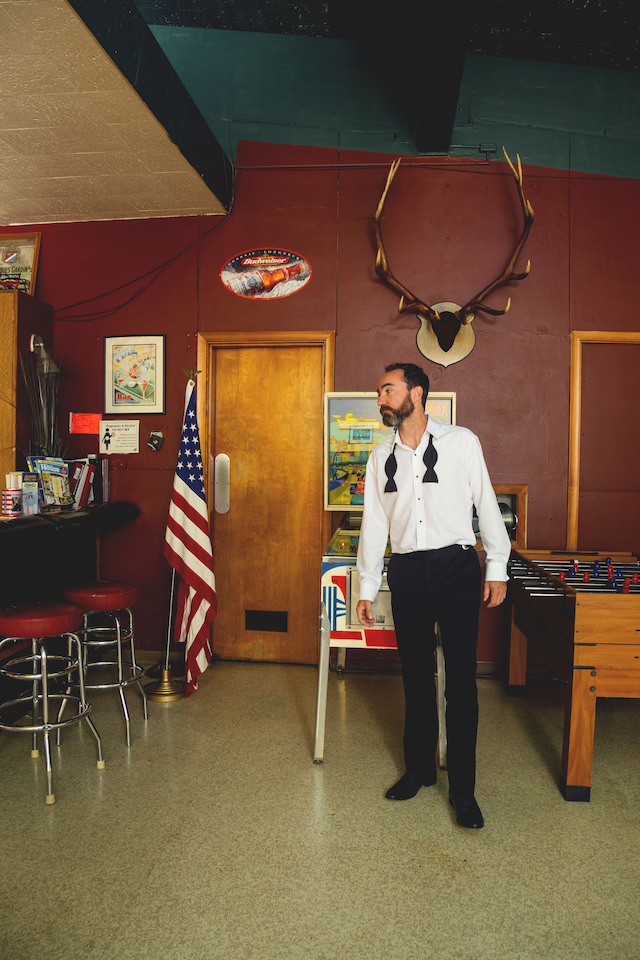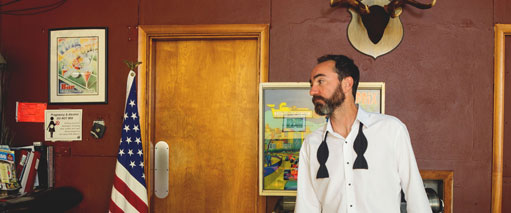New slang when you notice the stripes, the dirt in your fries/ Hope it’s right when you die, old and bony/ Dawn breaks like a bull through the hall/ Never should have called/ But my head’s to the wall and I’m lonely—“New Slang,” a song written by James Mercer for The Shins, from their breakthrough album, Oh, Inverted World.So, I spent the morning thinking about The Shins. I went to the morgue and dug through issues of Weekly Alibi from 2001. I found an archival copy of volume 10, number 25. That’s the one where Alibi Music Editor Michael Henningsen goes on and on about how the band is gonna turn the world upside down, how The Shins are Albuquerque’s Fab Four. I took a bound copy of that issue down to my office and proceeded to spill a spoonful of frozen burrito filling on page 31, the page where Oh, Inverted World gets a surprisingly limpid review from Stewart Mason. Later, my publisher stopped by the office and noted that I had gotten some chow on the archives; I reflected that among such a dusty and disused 25-year-old collection of newspapers, such was evidence of deeper meaning—in the far future such eager clumsiness would be viewed with great gravitas by other, yet unknown readers who had rocanrol on their minds or in their hearts.In between all of that, James Mercer, the visionary pop musician at the center of the multitenacled, multivoiced and mostly mysterious entity called The Shins gave me a bell. An Albuquerque native and generational cohort, we chatted briefly about all things Burque before getting to the meat of the day’s discourse. That meat, in case you want to know, had to do with the meaning and purpose of The Shins, past and present as well as—appropriately enough—the concept of here, there and everywhere as the band makes preparations to release its first album in more than five years. The release of Heartworms will coincide with a US tour that begins right here in Burque on March 2, with a sold-out gig at the Historic El Rey Theater. Weekly Alibi: James, how has your vision of The Shins, your feelings about the project, changed since your previous album, Port of Morrow, dropped about five years ago?Aesthetically, I have a new vision for the band. I am interested in different things, but mainly this is a record with an up-tempo vibe; I’ve embraced the pop side of my writing, whereas, even on Port of Morrow, I had the dregs of ’90s anti-pop sentiments at the forefront of my work.Pop is a guiding force for this latest effort, but I’d like to say that maybe rock and pop are dead in 2017. Ironically, your new album is filled with these elusively beautiful, very produced pop gems. How does that aesthetic fit into the post-rock, post-Radiohead landscape? How do you reconcile yourself with the massive changes that have taken place in the music world, post-millenium?I think what’s interesting, as you say that, is that I feel what is coming in the future—and these are just my views right now—is more aggressive guitar music, a return to rock and roll basics. When I listen to rock radio here in Portland, I rarely find anything interesting anymore. It all sounds like a video for Kinfolk Magazine, and that kinda makes me wanna fucking barf. I’m really sick of that [hipsterism]. What I do here as a pop influence on production and performance defies all these bands with their fancy beards and stuff.So are you talking about the tendency pop has taken toward so-called Americana? In other words, lo-fi. Acoustic, folky sort of music?What I’m talking about actually is this really highly produced stuff you hear all the time, like Twenty One Pilots.Is your mission, then to reinvigorate rocanrol through the participation of The Shins?I never liked it [alt-rock], and now I am utterly exhausted by it. I can hardly listen to alternative rock radio anymore. I don’t feel a part of any sort of thing at all. I don’t feel that way, I feel like [The Shins] are something other. I mean, do I want to thumb my nose at the stuff we’re describing? Yes! I’m interacting all right, but more out of spite and anger than a desire to save something. I’m not trying to correct anyone [in the music industry] or help them in any way. I want them all to fucking disappear.So although you see yourself as an outsider, you do realize that work from your classic period, like Oh, Inverted World is considered a pop masterpiece? After that, do you still see yourself as someone who is on the outside looking in?Yes, that’s true. My recollection of that time is that I was possessed by a similar level of vitriol about the music scene. Back then, every band was made up of some combination of Pavement and Nirvana.But didn’t you break through that post-Nirvana haze?And found a little niche. Look Pavement and Nirvana are two of my favorite bands, and I was immersed in that stuff. It’s just when you find yourself in a situation where that kinda music becomes the wallpaper, the background noise, it gets tiresome. When you go into the studio and start working on stuff, I think it’s important to decide what you fucking don’t want to be anymore. Start there. What are you hating on right now?So, we kinda started this record with that attitude. We don’t want to be Mumford & Sons, we don’t want to be The Head and The Heart. Not that they’re bad bands … I hope you get what I’m saying.I get it. You’re espousing a classic punk attitude about rock music, which I find very invigorating, because I don’t think a lot of younger rockers are willing to address the issues you’re addressing. But what else inspired this album?I really fell in love with the work of Ariel Pink. Not just the pop stuff either but also just the fucking weirdness. He’s someone who feels incredible artistic freedom, that’s the way he comes across. And that was really exciting to me. I’m also really stoked about Angel Olsen’s latest record.Well, I listened to Heartworms last night and then again this morning and can’t help but feel there’s this wide-ranging complexity, an attention to pop music history at the work’s heart. It’s rather sprawling. What kind of long-term influences do you have?In high school, in England, I listened to The Cure. I just listened to “Boys Don’t Cry.” There’s a lot of influence there. I can’t get away from Johhny Marr, either.How are millennials reacting to that sort of thing?I’ve had a good response to my work from younger people to songs from the album like “Cherry Hearts,” which sorta has a hip-hop influence in its production and presentation. But on a song like “Mildenhall,” which is basically country-Western, I get a very polarized response from that age group. So it’s all kinda variable.But what you’re doing goes beyond simply characterizing genres. It’s not derivative, it’s rather at the forefront, am I right?Dude, you know I was talking to one of my other interviewers about Grimes and her new record which is ultimately avant-garde. I love it, but it’s very out there, production-wise. That’s very awesome to me. When I compare my songwriting to her, it seems relatively tame.So you’re kinda in the experimental wing of pop music now, defying convention while you’re at it, taking a different direction than the course pop music decided to take?That’s an interesting way to put it. Only some of it is intentional. Most of it is visceral. This is stuff I get angry about. American music feels milquetoast, it feels like a Kinfolk Magazine cover to me.Sitting here, reading the article Alibi Music Editor Michael Henningsen wrote about you in 2001, it occurs to me that he saw The Shins as a band, when it turns out it’s always mostly been you. Is that something you’d care to comment on?Yeah, I can see where Henny got that because the band that came before The Shins, Flake, was really collaborative. I really wanted that to be true for the sake of my bandmates. My solution at the time was not to brag about how I was the songwriter, et cetera. I didn’t feel comfortable defining the band back then. I’m to blame in that I didn’t want to make that story clear at first. I wanna be in a band. I wanna be in The Beatles. But it didn’t work out that way. That’s rock and roll.What sort of trajectory are you following as The Shins rise up again?I don’t have the same sort of ambition. I don’t know if my sights can be set that high again. We’re going to tour the hell out of this record. We are damn proud of it. By starting our tour in Albuquerque, we are saying we were party to that vestige that was the local scene but also providing evidence that we are what comes next, too.
The ShinsThursday, March 2, 2017 • 7pmThe Historic El Rey Theater • 622 Central SW










